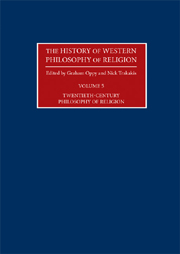Book contents
- Frontmatter
- Contents
- Editorial Introduction
- Contributors
- 1 Twentieth-Century Philosophy of Religion: An Introduction
- 2 William James
- 3 Henri Bergson
- 4 John Dewey
- 5 Alfred North Whitehead and Charles Hartshorne
- 6 Bertrand Russell
- 7 Max Scheler
- 8 Martin Buber
- 9 Jacques Maritain
- 10 Karl Jaspers
- 11 Paul Tillich
- 12 Karl Barth
- 13 Ludwig Wittgenstein
- 14 Martin Heidegger
- 15 Emmanuel Levinas
- 16 Simone Weil
- 17 A. J. Ayer
- 18 William P. Alston
- 19 John Hick
- 20 Mary Daly
- 21 Jacques Derrida
- 22 Alvin Plantinga
- 23 Richard Swinburne
- 24 Late-Twentieth-Century Atheism
- Chronology
- Bibliography
- Index
12 - Karl Barth
- Frontmatter
- Contents
- Editorial Introduction
- Contributors
- 1 Twentieth-Century Philosophy of Religion: An Introduction
- 2 William James
- 3 Henri Bergson
- 4 John Dewey
- 5 Alfred North Whitehead and Charles Hartshorne
- 6 Bertrand Russell
- 7 Max Scheler
- 8 Martin Buber
- 9 Jacques Maritain
- 10 Karl Jaspers
- 11 Paul Tillich
- 12 Karl Barth
- 13 Ludwig Wittgenstein
- 14 Martin Heidegger
- 15 Emmanuel Levinas
- 16 Simone Weil
- 17 A. J. Ayer
- 18 William P. Alston
- 19 John Hick
- 20 Mary Daly
- 21 Jacques Derrida
- 22 Alvin Plantinga
- 23 Richard Swinburne
- 24 Late-Twentieth-Century Atheism
- Chronology
- Bibliography
- Index
Summary
Writing to a close friend in 1922, Karl Barth (1886–1968) confessed bewilderment at the work of John Calvin, the sixteenth-century Protestant Reformer (see Vol. 3, Ch. 4). “Calvin is a cataract, a primeval forest, a demonic power”, he wrote. “I lack completely the means, the suction cups, even to assimilate this phenomenon, not to speak of presenting it adequately” (Barth 1964: 101). While such flourishes of rhetorical creativity may be in short supply at present, comparable reactions to Barth – arguably the greatest Protestant thinker of the twentieth century – are fairly common. Dismay at finding most interpretive paradigms inadequate; perplexity in face of a prose style accessible, yet stretched to conceptual breakingpoint; astonishment at a ‘Christological concentration’ that inhibits freewheeling speculation, but enables doctrinal innovation on a grand scale: these are common responses among those who come newly to Barth. While few read without sensing a formidable intellect at work, many find themselves overcome by the scope and drift of Barth's thought.
This chapter obviously cannot provide the ‘suction cups’ needed to gain purchase on Barth. Such appendages must be self-grown; their development requires a sustained engagement with the original texts. My aim is rather to orient readers to key features of Barth's thought, focusing primarily on the multi-volume Church Dogmatics.
The eldest child of Anna Katharina and Johann Friedrich Barth, Karl was born in the northern Swiss city of Basle in 1886.
- Type
- Chapter
- Information
- The History of Western Philosophy of Religion , pp. 145 - 160Publisher: Acumen PublishingPrint publication year: 2009

